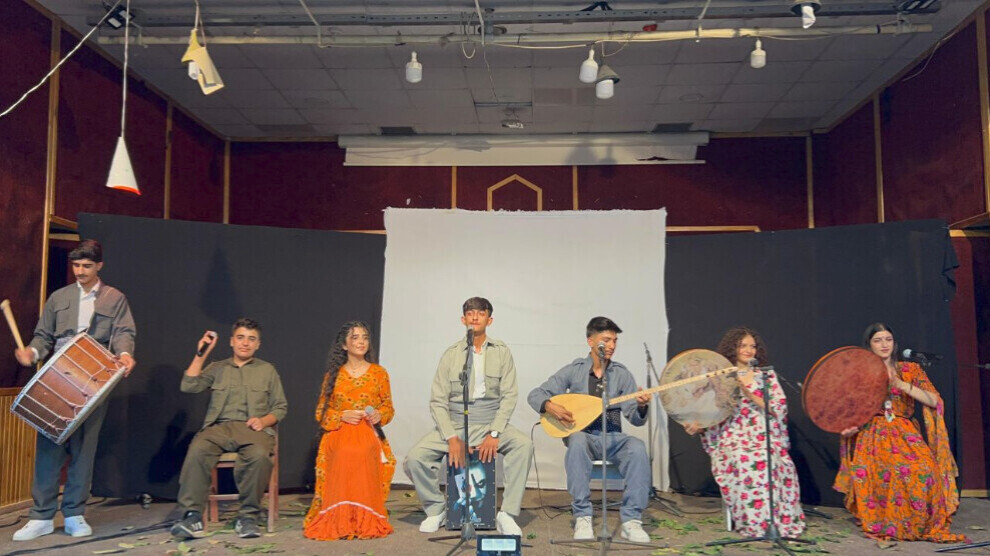Summer School for Music and Theater in Rojava sees participation of dozens of students
Dozens of young people spent three months intensively engaged in cultural education in the Summer School for Music and Theater.
Dozens of young people spent three months intensively engaged in cultural education in the Summer School for Music and Theater.

The Summer School for Music and Theater (Dibistana Havîn) under the direction of the theater commune Şanoya Çiya in Rojava, ended after three months of intense work. Many young people engaged with musical instruments, singing and theater and expanded their cultural and artistic education, as well as their understanding of solidarity. The summer school was carried out on the basis of both local and international support and has shaped many children and young people in Rojava over the last few months.
"Strengthening the common values of different societies"
Simko Cûdî, member of Şanoya Çiya, told ANF: "This project aimed to spread art among young people and increase their interest in different cultural disciplines. We wanted to strengthen the common values of Assyrian, Arab, Kurdish, Armenian and Yazidi societies and give the participants a summer full of art."
"Children included in the project"
The project, led by Şanoya Çiya, was supervised by three art teachers and began in June, Cûdî explained, adding: "The summer school offered lessons five days a week. The project was originally planned for young people aged 14 to 18, but due to the strong demand from children and their interest in theater and music, children were also included in the project."

Education in theater and music
Cûdî continued: "For three months, instrumental lessons, choir work and music instruction as well as ear and voice training were carried out in the music area. In the theater area, acting, writing, drama, voice and diaphragm exercises, gestures and facial expressions were trained. In addition, young people and children gain experience by directly participating in theater performances.
47 students took part in the training, including nine young women and 15 children. Thanks to the participation of the Stêrk organization, the children and young people received information on the topics of environmental and personal hygiene, respect and love. The importance of culture was particularly emphasized.

Dengbêj days
Various cultural activities always took place on Fridays. "For example, - said Cûdî - on the twelve Fridays there were four theater performances of works done in the summer school, including the plays Wê Werin, Vêjîn and Em yan Ez. Films such as Ji Bo Azadî and 14 Tirmeh were shown. Dengbêj days with the participation of children, young people and the elderly took place. This made many of the participants even more enthusiastic about the cultural sector."
The participants of the summer school also took part in the children's festival in Rîmêlan. Cûdî said: "At this festival, the plays Çîrok û Çîvanok, which is aimed at children and deals with the themes of honesty, love and respect, and Nezanî Rehetiya Canî, which is aimed at young people and deals with personal development, encouraging them to read and continue their education, were performed. In addition, a choir of young women and a 40-member children's choir sang and brought life to the festival with their music."

International support
Cûdî said that various bodies and institutions in Europe and Northern and Eastern Syria are supporting a summer school project, and added: "The dialogue we have with institutions in Europe contributes to the recognition of the cultures in Northern and Eastern Syria and to strengthening cultural interaction. In addition, the projects of the Rojava revolution are promoted worldwide. Last year, the municipality of Durango in the Basque Country, Fonti Di Pace association, Società inFormazione, Teatro Degli Incontri, Teatro Ura, Oltreunpo Teatro and the Comunità Brasiliana in Rome, Junta Administrativa Gopegi, supported our artistic activities by adopting and sponsoring several theatre children groups. This year, Fonti Di Pace made an important contribution to the summer school. In addition, the support of the children's group Stêrk, Jineolojî and Jinwar in Northern and Eastern Syria was also important."
Artistic projects continue
Simko Cûdî said: "The children and young people who participated in the summer school were able to gain valuable experience. This project was also a great opportunity for those who want to participate in the College of Arts. In this way, children and young people can preserve and develop the cultural values of society. Just as we have completed a summer of art with the summer school, the young people will continue their activities as a theater team in the Dicle Cultural and Art Center as a result of this training. The children will continue their education by meeting once a week, until next summer, when we meet with a stronger project."
Objectives of the project
The main objective of the Summer Art School is to promote the social, ethical and ethnic values of young people from different cultures (Kurdish, Arab, Assyrian, Armenian) and religious backgrounds (Christian, Yazidi, Muslim) using education and artistic activities, with special reference to theatre, as a common medium.
The project also aims at training students as artists always with the final goal of creating a culture of democratic life. The project intends to promote a culture of free art, through the recognition and enhancement of different cultural and social values.
The Summer Art School project is a collective effort of common work and production through theatre, always encouraging participation and promotion of differences to contribute artistically to the development of a plural cultural identity.
Theatre classes
The theatre training takes place at the school for 3 months during the summer period and ends with different theatre performances as well as with the representation of a theatre performance specially prepared by the students.
As part of the theatre training, classes in writing, directing and acting are given. A total of 12 artistic-theatre events (performances, seminars, etc.) are held, i.e. one event per week.